By: Eric Sugar, President, ProServeIT Corporation
There’s a radical shift to enterprise social networks happening in our world today. Fueled by the need for employees to use more effective tools to collaborate with their colleagues, organizations are turning to enterprise social networks, like Microsoft, Workvivo, and Slack, to try and encourage communication.
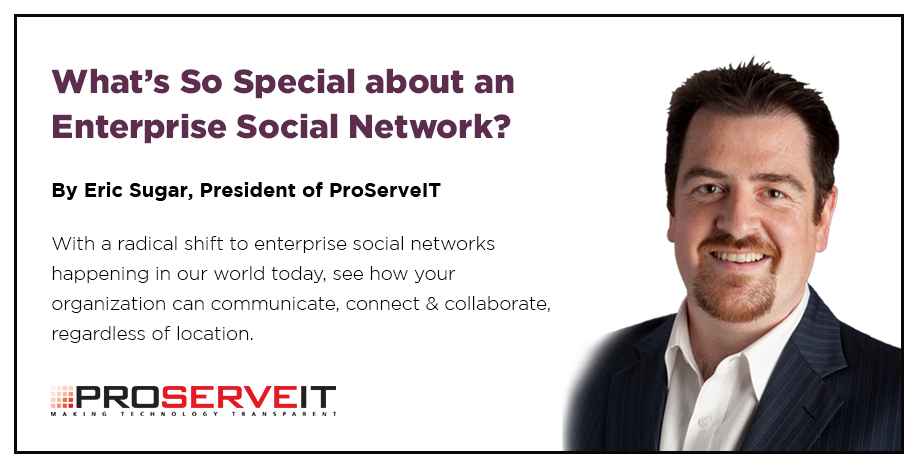
Typically occurring in the Cloud, an enterprise social network provides the opportunity for a number of people with similar business interests/activities to connect and collaborate, regardless of their location.
An #EnterpriseSocialNetwork provides the opportunity for your organization to connect and collaborate, regardless of location.
But these enterprise social networks that organizations are trying to implement have actually led to more noise, especially if they’re not implemented correctly, if organizations choose the wrong one, or if there are just too many in use at any given time. This leads some organizations to wonder, just what’s so special about an enterprise social network?
Today, we’re going to outline four important reasons why you should consider an enterprise social network for your organization, and, to address this question, we’ll also outline some of our don’ts for implementing an enterprise social network.
4 Key Benefits of an Enterprise Social Network
Here’s a reality that seems ironic: email is rapidly becoming outdated. It’s no longer a channel that’s conducive to collaboration. You can’t see when someone’s typing a reply, you don’t always get useful or appropriate feedback, and you can’t see who’s read the messages (unless you send a read receipt with the email – and who really likes those?).
#Email is rapidly becoming outdated. An #EnterpriseSocialNetwork is much more conducive to #TeamCollaboration, providing faster & better feedback capabilities.
Instead, email is being replaced with enterprise social networks, which have been effective in eliminating email pain points through their many built-in features and benefits. Four of those benefits will be discussed below:
#1: An Enterprise Social Network Builds a Strong and Inclusive Corporate Culture
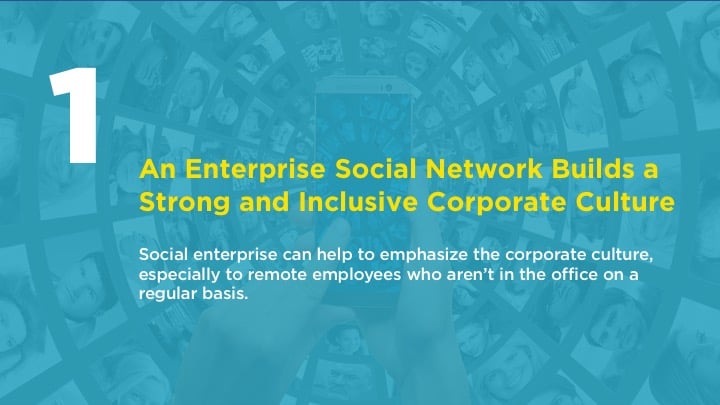
Consider what happens when you first hire someone. You may have covered corporate culture in the interview process, but more likely than not, you’re going to take some time for that employee to sit with some of your veterans to learn about corporate culture from them. There’s certainly nothing wrong with this approach, of course, but what happens when the person you just hired lives in France, and will be covering the French market for you?
An enterprise social network certainly won’t make your corporate culture – after all, corporate culture should be in place long before you implement a social enterprise tool - but social enterprise can help to emphasize the corporate culture, especially to remote employees who aren’t in the office on a regular basis. It can also help new employees get caught up by being able to go into their enterprise social network and see previous posts that help to give them a feel for what kind of company you’re running.
#2: Enterprise Social Networks Encourage Openness and Employee Involvement
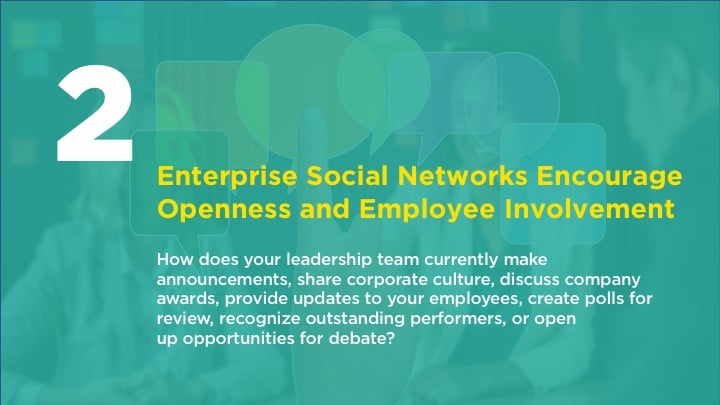
How does your leadership team currently make announcements, share corporate culture, discuss company awards, provide updates to your employees, create polls for review, recognize outstanding performers, or open up opportunities for debate? When keeping employees informed, your leadership team needs a tool that can spread their message in an easily digestible manner, and at the same time, foster a place for openness and dialogue with those reading the messages.
An enterprise social network is capable of providing an appropriate platform that can reach employees on any device, at any time, and provides those employees the chance to like, share, or comment on the threads in real-time. Thanks to the openness and transparency that an enterprise social network creates, your leadership team can get a bead on what exactly your workforce is feeling at any given time about any particular subject.
#3: An Enterprise Social Network Provides A Solid Framework
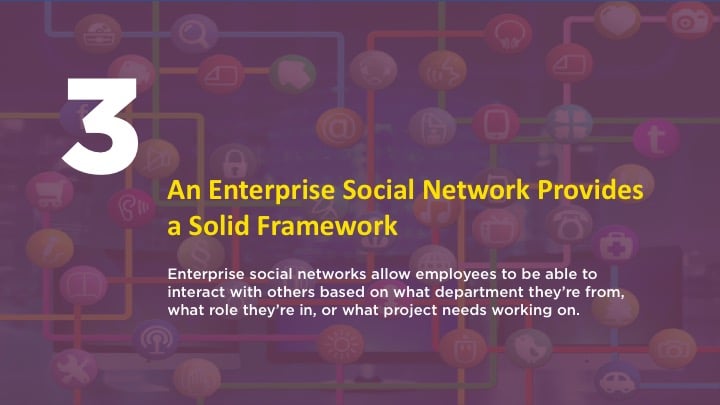
Enterprise social networks allow employees to be able to interact with others based on what department they’re from, what role they’re in, or what project needs working on. A good enterprise social network can allow you the freedom to create groups, whether they be open groups, private groups, or even multi-company groups, as a framework for collaboration.
Some of these enterprise social networks provide privacy and permissions, which is a great security feature that gives better control to admins to decide which employee can see what content. If you are looking for feedback from your customers, multi-company groups can allow for intercompany collaboration.
Want a place where your HR team can discuss performance reviews, talk about benefits and compensation, or other confidential information? Create a private “HR” group that only that team has access to. Want to give your CEO a platform to announce company-wide news? Create an open “CEO” Group where he or she can post those announcements! Want to point out employees who have gone above and beyond the call of duty? An “Internal Kudos” group is a place to congratulate those deserving employees.
Simply put, with an enterprise social network, the framework is there to make the platform whatever you need it to be.
#4: Enterprise Social Networks Help Mobile or Remote Workers Feel Like Part of the Team
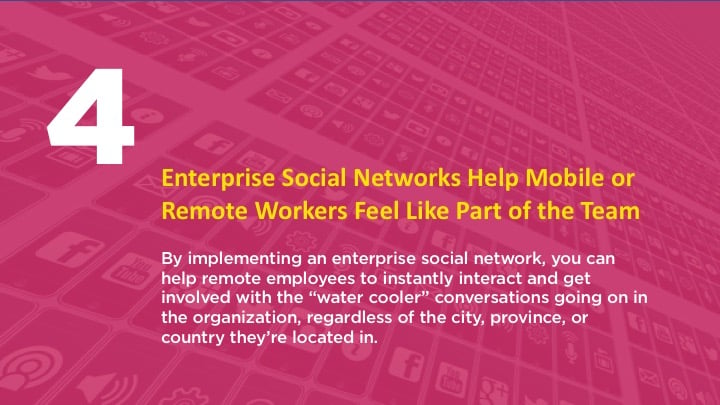
The hard reality of today’s modern workforce is that there is no more “water cooler” environment, where people can gather and discuss changes that are happening in the company, talk about what they did on the weekend, or get to know their colleagues better. Since there are more and more remote workers, your organization may have several employees who increasingly feel estranged from these sorts of conversations, and, in turn, don’t feel like they’re a part of what’s happening at the office.
So, in addition to gaining a sense of the organization’s corporate culture, with a mobile-enabled enterprise social network, new employees can feel like they’re a part of the team/community more rapidly. By implementing an enterprise social network, you can help these remote employees to instantly interact and get involved with the “water cooler” conversations going on in the organization, regardless of the city, province, or country they’re located in.
An #EnterpriseSocialNetwork gives new employees, especially #RemoteWorkers, a better flavour for your #CorporateCulture, allowing them feel like part of the team/community more rapidly.
Enterprise Social Networks: A Cautionary List of Don’ts
With this new emphasis on collaboration via an enterprise social network, we’d be remiss if we didn’t caution you on a few things. Here’s our list of a few don’ts to keep in mind when beginning your journey to social enterprise collaboration:
- Don’t pick an enterprise social network that doesn’t tie together with other programs your organization is using! What good are messages and feeds when you have to sort through them in two or three platforms that don’t talk to each other on the back end?
- Don’t let your employees get lost in the enterprise social network you’re putting in place to help them! Make sure that your enterprise social network has structure and governance when implementing it, otherwise your employees will get too bogged down in these tools and will end up reverting to less-efficient methods, like email, to communicate.
- Don’t fall for every enterprise social network that’s on the market! Do your research carefully and make sure that you know the pros and cons of each platform before you implement it. Not all enterprise social networks are created equal. Interested in which one we recommend? Ask our experienced team!
Consider an Enterprise Social Network for Your Organization: Get Started Today!
As you can see, an enterprise social network is an important part of creating a modern workplace for your employees and encouraging collaboration between them, which, in turn, fosters innovation and growth. Are you ready to take a leap into the future and consider an enterprise social network for your organization? Interested in how you can get started? Contact us today!
Tags:
AzureSeptember 20, 2018
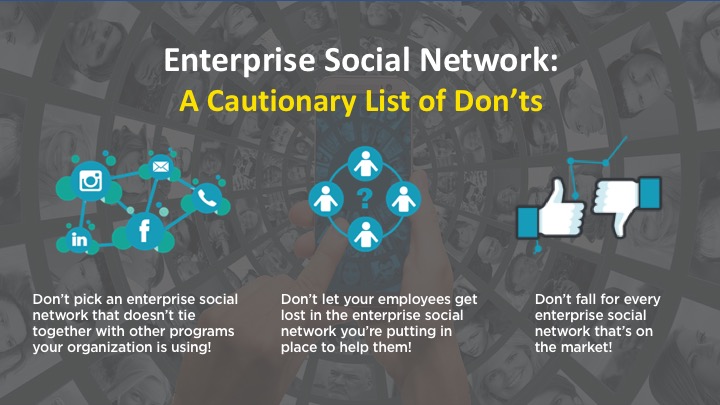



Comments